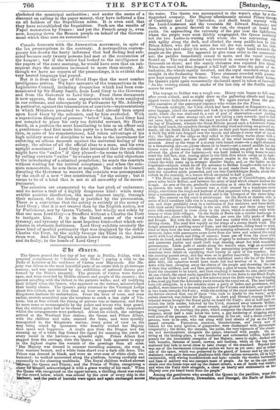Canada ferments with the Annexation movement, in spite of the
lax presumptions to the contrary. A metropolitan contem- porary has drawn the hasty inference that bad feeling had sub- sided because only twenty persons had met at the convention of the League ; but if the writer had looked to the intelligence in the papers of the same morning, he would have seen that on sub- sequent days the numbers increased to more than ninety. Al- though we have no reports of the proceedings, it is evident that very heated language had passed.
But it is from the Cape of Good Hope that the most sombre intelligence arrives. We have accounts of the transactions in the Legislative Council, including despatches which had been com- municated by Sir Harry Smith, from Lord Grey to the Governor and from the Governor to Lord Grey. From these documents it now appears, that the same arguments which were employed in our columns, and subsequently in Parliament by Mr. Adderley in particular, against the transmission of convicts—representations to which Ministers promised to defer—had already been urged upon Lord Grey by the colonists, and by him overruled. With a supercilious disregard of persons " below " him, Lord Grey had not scrupled to place his only too faithful servant, Sir Harry Smith, in a position the most humiliating to him as an officer and a gentleman—had first made him party to a breach of faith, and then, in spite of his remonstrances, had taken advantage of his high military sense of discipline to use him as the instrument for enforcing an odious measure against the universal feeling of the colony, the advice of all the official class to a man, and his own upright conscience! Lord Grey first intimated that the colonists might have the " exiles " if they pleased—he seems to think that by calling convicts " exiles " he evades part of the solid objections to the introducing of a criminal pouplation; he sends the convicts without waiting for the invited acceptance ; and when the colo- nists remonstrate, he sets them at nought. The order in Council directing the Governor to receive the convicts was accompanied by the draft of a new "free constitution" for the colony ; but it seems to be of a kind that is not at all unworthy of its accom- paniment.
The colonists are exasperated to the last pitch of endurance, and we notice a trait of a highly dangerous kind : while many exhibit positive disaffection, the most discreet imply, through their manner, that the feeling is justified by the provocation. There is a conviction that the colony is entirely at the mercy of Lord Grey; that it is not treated thus by the English nation, nor by Parliament, nor by Queen Victoria, but wholly and solely by that one man Lord Grey—a Strafford without a Charles the First to instigate him. It is in the literal sense of the word tyranny, and tyranny of the most hopeless kind—that which ori- ginates in obstinate feebleness. Lord Grey exhibits precisely the same kind of morbid pertinacity that was displayed by the sickly Charles the First, by the sickly George the Third in the Ame- rican war. And the English nation leaves the colony, its justice and its fealty, in the hands of Lord Grey !


























 Previous page
Previous page